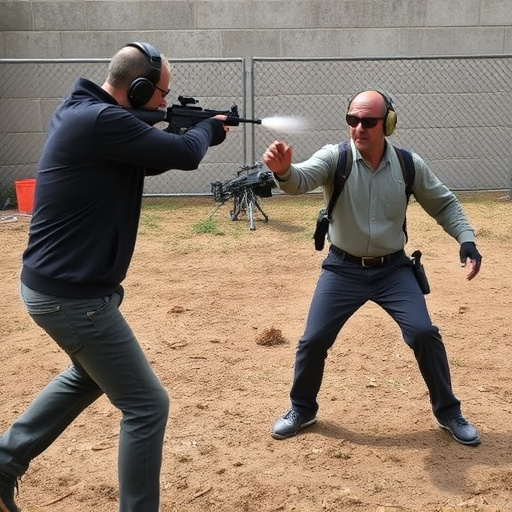Stun Gun Laws by State: Safety for Heart Patients & Future Regulations
Stun guns, popular for personal protection, face complex legal restrictions varying state-by-state d…….
Stun guns, popular for personal protection, face complex legal restrictions varying state-by-state due to health risks they pose to heart patients. Many states exclude individuals with certain cardiac conditions from owning or using stun guns, reflecting a balance between rights and public safety. Heart patients considering stun guns must navigate diverse regulations, understand device limitations, and prioritize their health, as shocks can trigger severe cardiac responses. Comprehensive user training and medical professional involvement in certification are essential to mitigate risks associated with stun guns for vulnerable populations.
“Unraveling the legal landscape surrounding stun guns, this article offers a comprehensive guide to state-specific regulations. With a focus on public safety and specific considerations for heart patients, we delve into the intricacies of stun gun ownership and use.
Key sections explore the risks associated with stun guns for cardiac individuals, a detailed analysis of varying state laws, and insights into future regulatory directions. Understanding these constraints is vital for responsible stun gun ownership and mitigating potential hazards.”
- Understanding Stun Guns and Their Legal Landscape
- Stun Gun Restrictions for Heart Patients: A Comprehensive Overview
- State-by-State Analysis of Stun Gun Laws
- Safety Considerations and Future Regulations for Stun Guns
Understanding Stun Guns and Their Legal Landscape

Stun guns, also known as electroshock weapons, are designed to incapacitate individuals by delivering a powerful electric shock. Despite their growing popularity for personal protection, stun guns operate within a complex legal landscape that varies significantly from state to state. Understanding these regulations is crucial before considering the purchase and possession of such devices.
One critical consideration pertains to users with heart conditions or other medical vulnerabilities. Stun guns can pose risks to individuals with cardiac issues due to the electric current they emit, which may trigger unwanted heart responses. Many states have specifically addressed this concern by placing restrictions on who can legally own stun guns, often excluding those with known health problems that could be exacerbated by such devices. These legal constraints reflect a delicate balance between individual rights and public safety, particularly when it comes to vulnerable populations.
Stun Gun Restrictions for Heart Patients: A Comprehensive Overview

For individuals with heart conditions, considering carrying a stun gun presents unique challenges and restrictions. Many states have implemented specific laws regarding stun guns, taking into account potential health risks for users and bystanders. The primary concern revolves around the possibility of deploying a stun gun on someone with an undetected or poorly managed cardiac condition, which could lead to severe consequences or even death.
In response to these risks, several states have placed restrictions on stun gun ownership for heart patients. These regulations may include mandatory medical evaluations and clearances from physicians before purchasing or carrying a stun gun. Some states also prohibit individuals with specific heart conditions, such as arrhythmias or congestive heart failure, from owning or using stun guns. This comprehensive overview aims to shed light on the varying legal landscape surrounding stun guns for heart patients across different states in today’s digital era.
State-by-State Analysis of Stun Gun Laws

In the United States, the legality of stun guns varies significantly from state to state. Understanding these differences is crucial when considering the potential risks and benefits for individuals, especially those with pre-existing health conditions such as heart problems. A state-by-state analysis reveals a patchwork of regulations that can make it challenging for consumers to navigate the legal landscape.
Some states, like California, have stringent restrictions on stun guns, prohibiting their possession without a concealed carry permit. Others, such as Texas and Florida, allow open carry with minimal licensing requirements. Certain states like New York require individuals to register their stun guns, while others may exempt them from specific regulations if used for self-defense. For heart patients, these variations are significant because the stress of using a stun gun could potentially exacerbate existing cardiac issues. Therefore, it’s essential to research and understand local laws before considering the acquisition of a stun gun to mitigate both legal and health risks.
Safety Considerations and Future Regulations for Stun Guns

Stun guns, while designed as self-defense tools, come with inherent risks that must be considered from a safety perspective. One critical aspect often overlooked is their potential impact on individuals with pre-existing medical conditions, particularly heart problems. Stun gun shocks can lead to adverse effects in such cases, as the sudden jolt of electricity can strain the cardiovascular system. This risk underscores the importance of thorough user training and understanding of the device’s limitations.
Looking ahead, future regulations may need to address these concerns more explicitly. Guidelines could be established to educate users about safe usage, especially for vulnerable populations. Additionally, medical professionals might play a role in certifying individuals’ fitness to carry stun guns, ensuring they are aware of potential risks and can make informed decisions regarding their use.
The legal landscape surrounding stun guns varies greatly from state to state, with specific restrictions impacting those with heart conditions. As we’ve explored, understanding these laws is crucial for both users and healthcare professionals. Given the evolving nature of regulations and safety concerns, continued awareness and advocacy are essential to ensure responsible use while mitigating potential risks for all individuals, especially those with pre-existing health issues like cardiovascular diseases. Navigating state-by-state restrictions and promoting open dialogue about stun gun safety can help foster a more informed and secure environment.


